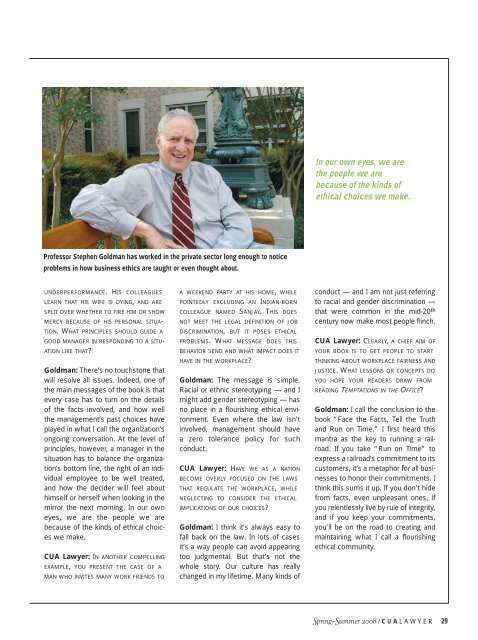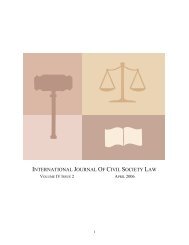Connected Minds,Connected Cultures:\ Connected Minds
Connected Minds,Connected Cultures:\ Connected Minds
Connected Minds,Connected Cultures:\ Connected Minds
- No tags were found...
Create successful ePaper yourself
Turn your PDF publications into a flip-book with our unique Google optimized e-Paper software.
In our own eyes, we arethe people we arebecause of the kinds ofethical choices we make.Professor Stephen Goldman has worked in the private sector long enough to noticeproblems in how business ethics are taught or even thought about.UNDERPERFORMANCE. HIS COLLEAGUESLEARN THAT HIS WIFE IS DYING, AND ARESPLIT OVER WHETHER TO FIRE HIM OR SHOWMERCY BECAUSE OF HIS PERSONAL SITUA-TION. WHAT PRINCIPLES SHOULD GUIDE AGOOD MANAGER IN RESPONDING TO A SITU-ATION LIKE THAT?Goldman: There’s no touchstone thatwill resolve all issues. Indeed, one ofthe main messages of the book is thatevery case has to turn on the detailsof the facts involved, and how wellthe management’s past choices haveplayed in what I call the organization’songoing conversation. At the level ofprinciples, however, a manager in thesituation has to balance the organization’sbottom line, the right of an individualemployee to be well treated,and how the decider will feel abouthimself or herself when looking in themirror the next morning. In our owneyes, we are the people we arebecause of the kinds of ethical choiceswe make.CUA Lawyer: IN ANOTHER COMPELLINGEXAMPLE, YOU PRESENT THE CASE OF AMAN WHO INVITES MANY WORK FRIENDS TOA WEEKEND PARTY AT HIS HOME, WHILEPOINTEDLY EXCLUDING AN INDIAN-BORNCOLLEAGUE NAMED SANJAY. THIS DOESNOT MEET THE LEGAL DEFINITION OF JOBDISCRIMINATION, BUT IT POSES ETHICALPROBLEMS. WHAT MESSAGE DOES THISBEHAVIOR SEND AND WHAT IMPACT DOES ITHAVE IN THE WORKPLACE?Goldman: The message is simple.Racial or ethnic stereotyping — and Imight add gender stereotyping — hasno place in a flourishing ethical environment.Even where the law isn’tinvolved, management should havea zero tolerance policy for suchconduct.CUA Lawyer: HAVE WE AS A NATIONBECOME OVERLY FOCUSED ON THE LAWSTHAT REGULATE THE WORKPLACE, WHILENEGLECTING TO CONSIDER THE ETHICALIMPLICATIONS OF OUR CHOICES?Goldman: I think it’s always easy tofall back on the law. In lots of casesit’s a way people can avoid appearingtoo judgmental. But that’s not thewhole story. Our culture has reallychanged in my lifetime. Many kinds ofconduct — and I am not just referringto racial and gender discrimination —that were common in the mid-20 thcentury now make most people flinch.CUA Lawyer: CLEARLY, A CHIEF AIM OFYOUR BOOK IS TO GET PEOPLE TO STARTTHINKING ABOUT WORKPLACE FAIRNESS ANDJUSTICE. WHAT LESSONS OR CONCEPTS DOYOU HOPE YOUR READERS DRAW FROMREADING TEMPTATIONS IN THE OFFICE?Goldman: I call the conclusion to thebook “Face the Facts, Tell the Truthand Run on Time.” I first heard thismantra as the key to running a railroad.If you take “Run on Time” toexpress a railroad’s commitment to itscustomers, it’s a metaphor for all businessesto honor their commitments. Ithink this sums it up. If you don’t hidefrom facts, even unpleasant ones, ifyou relentlessly live by rule of integrity,and if you keep your commitments,you’ll be on the road to creating andmaintaining what I call a flourishingethical community.Spring–Summer 2008 / C UALAWYER 29
















